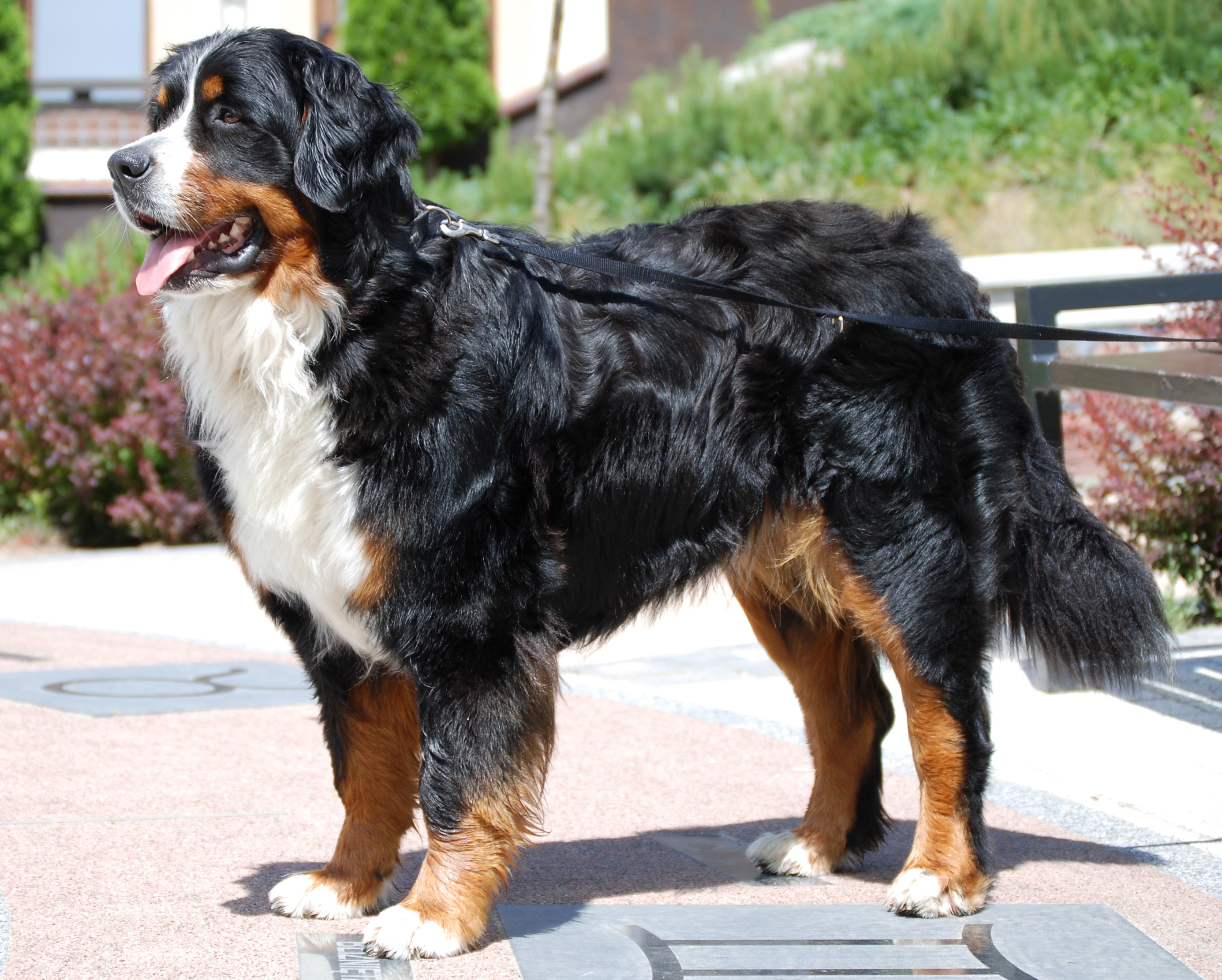
The Black Bernese Mountain Dog is a stunning breed, and if you're considering bringing one home, it's essential to know what to expect. They are a rare color variation of the Bernese Mountain Dog, with a thick, tri-colored coat that's predominantly black.
Black Bernese Mountain Dogs are known for their gentle and even-tempered nature, making them an excellent choice for families with children. They are highly intelligent and trainable, but they can be stubborn at times.
One of the most distinctive features of the Black Bernese Mountain Dog is their size - they can grow up to 26 inches tall and weigh between 80-120 pounds. This breed requires regular exercise and a balanced diet to maintain their overall health and well-being.
Getting Started
The Black Bernese Mountain Dog is a rare and beautiful breed, but it's essential to understand their needs and characteristics before bringing one home.
Their average lifespan is 6-8 years, making them a relatively short-lived breed.
These dogs require regular exercise to stay healthy and happy, so be prepared to take them on daily walks and playtime.
A balanced diet is crucial for their overall health, and they need to eat high-quality food that meets their nutritional needs.
They are intelligent and trainable, but they can be stubborn at times, so consistency and patience are key.
Their thick coats require regular grooming to prevent matting and tangling.
With the right care and attention, Black Bernese Mountain Dogs can thrive in a loving home.
Care
The black Bernese Mountain Dog is a beautiful breed that requires regular exercise to stay happy and healthy. They need at least an hour of walking or playing during the cool parts of the day.
Their large size requires a home and transportation that can accommodate them without being forced into cramped spaces. This means having a spacious yard where they can run around and play.
A black Bernese Mountain Dog's thick double coat requires brushing several times per week, if not every day, to prevent matting and control heavy shedding. You'll also need a good vacuum cleaner to deal with the extra fur.
Regular ear cleaning is important to keep your black Bernese Mountain Dog healthy, especially after they're in water. Use a veterinary-approved ear cleaner to prevent ear infections.
You should also be prepared for lots of loose fur and occasional strings of drool. A strong vacuum cleaner and plenty of lint rollers will be your best friends when living with a black Bernese Mountain Dog.
A black Bernese Mountain Dog's floppy ears can easily trap moisture, which can lead to an ear infection. So, be sure to dry their ears thoroughly after swimming or bathing.
Their grooming is fairly straightforward, but you should be prepared for seasonal shedding, which can be profuse and require daily brushing.
Health and Nutrition
Feeding your Black Bernese Mountain Dog a balanced diet is crucial for their overall health.
Commercial kibble or wet food that's compliant with the Association of American Feed Control Officials (AAFCO)’s standards is a good way to ensure your dog receives a complete and balanced diet.
Never give your dog a supplement, including omega-3, without speaking to your vet first, as they can help support the skin, coat, kidneys, joints, and heart.
To maintain a healthy growth rate in Bernese Mountain Dog puppies, proper amounts of fat, protein, and carbohydrates are necessary, and AAFCO-compliant puppy foods designed for giant and large dogs can provide all the necessary nutrition.
The best way to determine how much to feed a Bernese Mountain Dog is to talk with your veterinarian, as they can calculate how much you should feed your dog based on their size, metabolism, neuter/spay status, and activity level.
Common Health Problems
Bernese Mountain Dogs are generally a healthy breed, but like all large breeds, they can be prone to certain health issues. Their lifespan is about average for a large dog breed, ranging from 7-10 years.
A different take: English Mastiff Large
Hip and elbow dysplasia are genetic abnormalities that can affect this breed, leading to joint problems. These conditions are inherited, so they can't be prevented.
Blood disorders, such as Von Willebrand's disease, can also affect Bernese Mountain Dogs. This condition causes the blood to not clot properly.
Cancer is another health issue that can affect this breed. Histiocytic sarcoma is the most common type of cancer, and symptoms can include lethargy, weight loss, and decreased appetite.
Progressive retinal atrophy is a degenerative eye disease that can lead to blindness. This condition is a serious concern for Bernese Mountain Dog owners.
Bloat is a potentially lethal condition that can occur when the stomach bloats and twists. This can often be prevented by slowing down eating and avoiding certain foods.
Here are some common health problems that can affect Bernese Mountain Dogs:
- Hip and elbow dysplasia
- Blood disorders (Von Willebrand's disease)
- Cancer (histiocytic sarcoma)
- Progressive retinal atrophy
- Bloat
Diet and Nutrition
Fresh water should always be available for your dog. This is essential for their overall health and well-being.
A quality, nutritionally balanced canine diet is crucial for your Bernese Mountain Dog. Select a diet made for large breeds to ensure your puppy grows at a slow and steady rate.
Bernese Mountain Dog puppies need to eat more frequently, up to four times every day. This will help prevent joint problems and other issues.
Elevated bowls should be avoided, as they could increase the risk of bloat. Instead, use slow feeder bowls to slow down your dog's eating.
Always discuss the diet and quantity with your veterinarian to ensure your dog is eating properly. They can help you determine the best feeding schedule for your dog.
Feeding commercial kibble or wet food that's compliant with AAFCO's standards is a good way to ensure your Bernese Mountain Dog receives a complete and balanced diet.
For your interest: Bernese Mountain Dog Feeding Chart
They Are Cold-Weather
Bernese Mountain Dogs are perfect for people living in cold climates, as they were bred to work in snowy mountains.
They thrive on cold-weather activities like hiking, backpacking, and camping, and will happily join you on these adventures.
In cold weather, they'll enjoy a good romp in the snow, but once the fun is done, they'll be happy to hang out indoors with the family.
Bernese Mountain Dogs do better living in colder climates rather than warm ones.
Broaden your view: Bernese Mountain Dog Cold Weather
Shedding Is Plentiful
Shedding is a significant concern for Bernese Mountain Dog owners. They shed a lot, and this shedding is year-round.
Their thick, long, and wavy or straight double coats protect them from the extremely cold climate in their native Swiss Alps. This unique coat requires regular maintenance to prevent excessive shedding.
Berner owners can expect to vacuum daily, and brushing their thick coat at least twice a week is a must. If not, the shedding can get out of control.
Behavior and Training
The black Bernese Mountain Dog is a sweet and adaptable breed, but they can be shy in new settings. Proper socialization to dogs, cats, and people as puppies is key to helping them feel more confident as adults.
They tend to dislike being left alone and may develop separation anxiety if left for too long. A Bernese Mountain Dog's intelligence and eagerness to please make them highly trainable, especially with positive reinforcement techniques like clicker training.
Their large size means training is crucial to teach them to walk nicely on a leash and not jump up on people. A consistent training schedule, with multiple short sessions each day, is more effective than one long session.
Exercise
Exercise is essential for your dog's physical and mental well-being. Aim for a minimum of 30 minutes of moderate-intensity exercise every day.
You can start with simple activities like walks, hikes, games of fetch, or trips to the dog park. Bernese mountain dogs are quite athletic and can even compete in canine sports.
Daily outdoors time or other forms of activity, such as doggy daycare, are crucial for indoor dogs. Playdates with fellow friendly, outgoing dogs can be a great way to socialize your Berner.
Here are some examples of athletic activities you can try with your Bernese mountain dog:
- Obedience
- Agility
- Tracking
- Carting
Behavior and Training
The Bernese Mountain Dog is a breed that's relatively adaptable to change and minor stressors, but they can be shy in new settings if not properly socialized.
Their intelligence and eagerness to please make them highly trainable, especially with positive reinforcement techniques like clicker training.
Bernese Mountain Dogs dislike being left alone, and some may develop separation anxiety if left for too long.
Training is crucial for this breed, especially for large size and strength, so it's essential to teach them to walk nicely on a leash and not jump up on people.
To boost their comfort and confidence, it's recommended to expose them to different people, other animals, and various situations from an early age.
They respond well to consistent training sessions, and patience is key, especially since they take longer to reach full physical and mental maturity.
Here are some key training tips for Bernese Mountain Dogs:
Bernese Mountain Dogs are gentle and patient with children and other pets, making them a great addition to families with kids and other pets.
Frequently Asked Questions
Are there black bernese mountain dogs?
Yes, there is a variation of the Bernese Mountain Dog breed known as the Tri-Color or Tri Bernese, which has a black base coat, but not a pure black Bernese Mountain Dog. However, a rare and unique black coat variation does exist in some Bernese Mountain Dogs.
Featured Images: pexels.com


